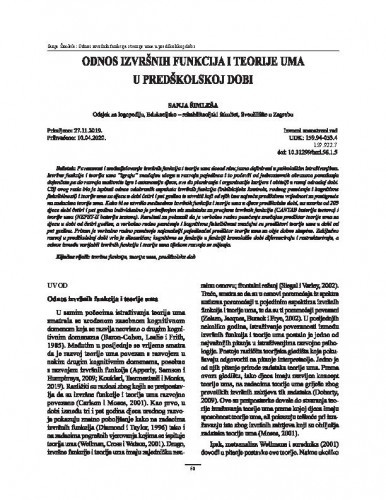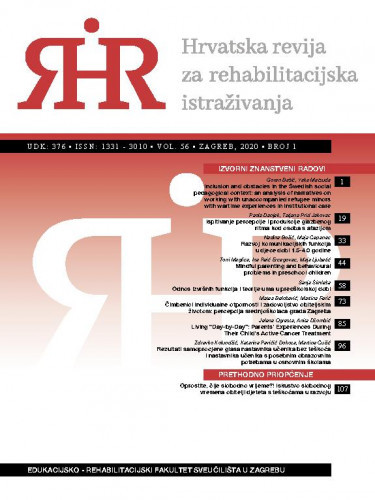Povezanost i međudjelovanje izvršnih funkcija i teorije uma dosad nisu jasno definirani u psihološkim istraživanjima. Izvršne funkcije i teorija uma „igraju“ značajnu ulogu u razvoju pojedinca i to počevši od jednostavnih obrazaca ponašanja dojenčeta pa do razvoja maštovite igre i autonomije djece, sve do planiranja i organizacije karijere i obitelji u ranoj odrasloj dobi. Cilj ovog rada bio je ispitati odnos odabranih aspekata izvršnih funkcija (inhibicijske kontrole, radnog pamćenja i kognitivne fleksibilnosti) i teorije uma za djecu u dobi četiri i pet godina te utvrditi koji od njih ima najveću prediktivnu vrijednost za postignuće na zadacima teorije uma. Kako bi se utvrdio međuodnos izvršnih funkcija i teorije uma u djece predškolske dobi, na uzorku od 203 djece dobi četiri i pet godina individualno je primijenjen niz zadataka za procjenu izvršnih funkcija (CANTAB baterija testova) i teorije uma (NEPSY-II baterija testova). Rezultati su pokazali da je verbalno radno pamćenje značajan prediktor teorije uma za djecu u dobi od četiri godine, a verbalno radno pamćenje i kognitivna fleksibilnost značajni su prediktori teorije uma u dobi od pet godina. Pritom je verbalno radno pamćenje najsnažniji pojedinačni prediktor teorije uma za obje dobne skupine. Zaključno razvoj u predškolskoj dobi vrlo je dinamičan; kognitivne se funkcije u funkciji kronološke dobi diferenciraju i restrukturiraju, a odnos između varijabli izvršnih funkcija i teorije uma tijekom razvoja se mijenja.; The connection and interaction between executive functions and theory of mind have not yet been clearly defined in psychological research. Executive functions and theory of mind play a significant role in the development of the individual, starting from simple patterns of infant behaviour to the development of imaginative play and autonomy of children, through to planning and organising careers and families in early adulthood. The aim of the present study was to examine the relationship between selected aspects of executive functions (inhibitory control, working memory, and cognitive flexibility) and theory of mind for children aged four and five, and to determine which aspect has the greatest value for predicting achievement in tasks involving the theory of mind. In order to determine the relationship between executive functions and theory of mind in preschool children, a set of tasks was applied individually to a sample of 203 children aged four and five. Executive functions were evaluated using the CANTAB test battery, and theory of mind was assessed using the NEPSY-II test battery. Verbal working memory was a significant predictor of theory of mind in children as young as four, and verbal working memory and cognitive flexibility were significant predictors of theory of mind at the age of five. At both ages, verbal working memory was the strongest single predictor of theory of mind. These results suggest that pre-school development is very dynamic, cognitive functions differentiate and restructure with age, and the relationship between variables of executive functions and theory of mind changes during development.
Sažetak

 Hrvatska revija za rehabilitacijska istraživanja : 56, 1(2020) / urednica, editor Jelena Kuvač Kraljević
Hrvatska revija za rehabilitacijska istraživanja : 56, 1(2020) / urednica, editor Jelena Kuvač Kraljević